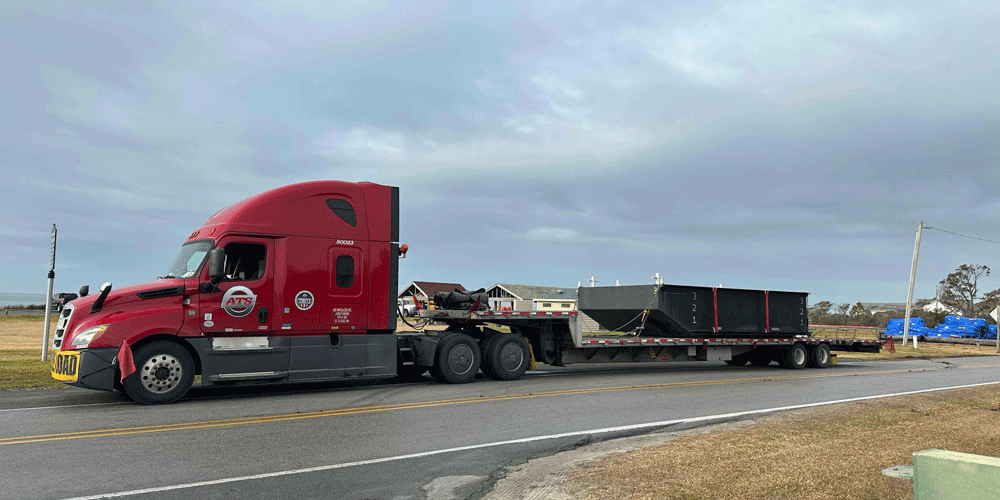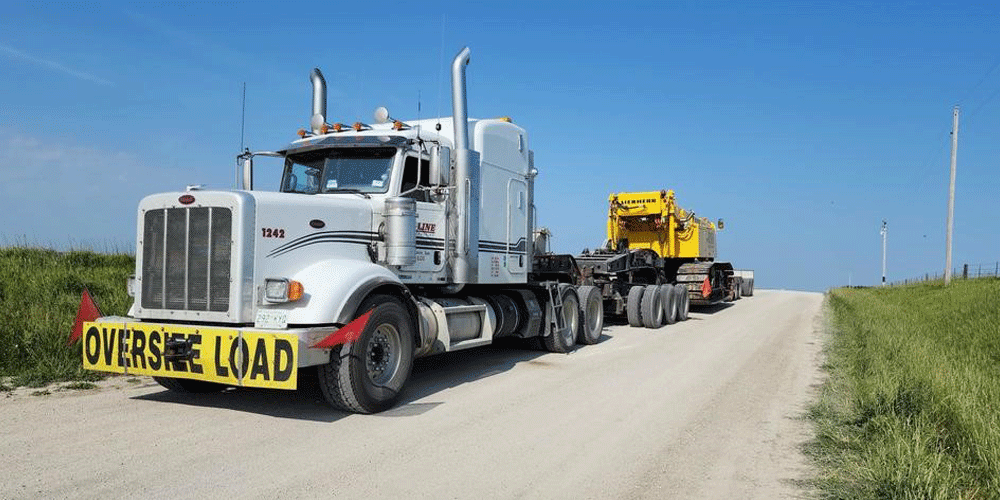Lori doesn’t like to talk about how much time has passed but, she’s spent about 20 years in trucking – over half of that with ATS. Lori’s current role within ATS is operations manager for the specialized division. Her trucking experience includes: LTL, customer service, fleet management, and she even spent some time driving herself.
Disclaimer: This article applies to company drivers only.
As a truck driver, you’re constantly inundated with ads. Everywhere you look, some company is advertising how much better their company is than the one you drive for.
“Make more money at our company than you’ve ever earned at that awful Company X!”
“Earn so much money even billionaires will be asking how you did it!”
“Your current company sucks! Come drive for us at Company B!”
Did I make these taglines up? Yes. But they’re honestly not that far off from some of the ads out there.
Some ads are pretty convincing. We’re only human. We’re curious. The nature of the trucking industry is such that it isn’t stable. In fact, the very defining characteristic of the trucking industry is instability. So, of course, if you have the opportunity to improve your financial situation, you’ll go for it.
Look, are some of these ads truthful? Will you actually make more money if you switch companies? Sometimes, yes.
But sometimes no.
But what do you do when you find out the grass truly wasn’t greener on the other side and you’d like to go back to the company you were previously driving for? Can you go back? Should you go back? Will the company even rehire you?
We’ve got a lot of information to unpack in this one. As the director of operations in the specialized division at Anderson Trucking Service (ATS), I’m one of the decision-makers in driver rehires.
In this article, I’ll let you in on a few little secrets you may or may not know about driver rehires. I’ll give you some tips and explain the pros and cons of returning to a company you used to drive for.
Should You Return to an Old Company?
Before we tackle whether you should go back to a company you’ve previously driven for, let’s tackle why drivers quit in the first place.
Drivers leave companies all the time. There’s a reason trucking has such a high turnover rate. One of the things that’s consistent with the trucking industry is that it’s not consistent, which is largely due to the cyclical market. Pay is largely affected.
Pay is by far one of the biggest reasons drivers jump companies so often.
In one season, a driver might haul two loads per week and take home a cool $2,500. In another season, they could haul the same two loads but only take home $1,200. This is not only frustrating, but it’s also hard to plan for and hard to accept.
As a result, it can be hard to accept that the cyclical nature of the market isn’t controlled by the organization, but rather by economics.
At the same time, you’re being inundated with ads (see introduction) that try to convince you that it is, in fact, your crappy company. As a truck driver, it’s not uncommon to receive multiple offers from other trucking companies promising you’ll make far more money with them. You can’t blame a driver for taking that opportunity to see if they can financially better their situation.
Drivers may also leave companies because they want better support and respect, they need a different home time situation, or they need to take care of something at home.
These are largely the same reasons drivers end up coming back to a company they’ve previously driven for.
Before you go back to a company you’ve driven for, consider some of the pros and cons.

The Pros of Returning to an Old Trucking Company
There are a ton of pros of going back to a trucking company you’ve driven for before. You know exactly what to expect and exactly what you’re getting out of the deal. There’s little to get used to or learn because you’re already familiar with the company.
You’re probably familiar with the freight lanes (unless you haven’t driven for the company in years), you might still know some of the people you’ll be working with, and you’ll be familiar with the equipment, how the pay schedule works, and your career opportunities.
Because you know exactly what you’re getting, you won’t be surprised by anything (like you might be when you go to a new company).
Chances are, if you’re returning, the company you’re going back to has what you’re looking for when it comes to pay, respect, equipment, and home time. It’ll be like going home.
The Cons of Returning to an Old Trucking Company
For some, the cons of going back to a company are similar to the pros: You know exactly what you’re getting. If you don’t particularly like the company you’re going back to, knowing you’re going to be dealing with the same old same old will most likely be a con for you. If that’s the case, you should ask yourself why you’re going back in the first place.
Pride is a common characteristic amongst truck drivers, so you might struggle to return, feeling like you’ll deal with a whole lot of “I told you so.”
Understandably, you might feel that way, but I assure you, we’re happy when drivers come back to the fleet. Companies want to retain their drivers and they’re happy to rehire drivers.
Why? They know exactly what they’re getting with you when they rehire you. They know what to expect, whereas they don’t know what to expect with a brand-new driver.
Because rehires have a proven successful track record, rehiring drivers is increasing in popularity. Carriers are in the game of retaining drivers, not losing them.
How to Get Rehired at Your Old Trucking Company
It’ll vary from company to company, but you can pursue rehire status in a few ways. You could reach out to your old dispatcher (or someone you worked with in operations), you could contact your old recruiter, or you could simply fill out another application online.
Whichever channel you choose, sooner or later, the people you used to work with (if they’re still with the company) will be reviewing your file. Your track record with the company will go a long way.
In the process of getting rehired, you may have to go through a lot of onboarding processes all over again, especially depending on how long ago you worked for the company.
For example, you’ll have to do a drug test again, fill out paperwork, and ensure you have proper medical clearance, but you may not have to attend the entire orientation class again. (Reminder: This will vary from company to company and depending upon your experience and time with the company.)
If you’re looking to get rehired, there are some things you should do and things you shouldn’t do. Here’s how you can all but guarantee you’ll get rehired at an old trucking company.

Leave on Good Terms
If you want to get rehired, you’ll absolutely ruin your chances if you don’t leave on good terms.
It’s best practice to put in a two-week notice, be professional and safe as you deliver your remaining loads, and turn in your equipment to the appropriate destination.
It’s not enough to just put in a two-week notice. If you stop caring about your work after you put in that notice, you can ruin your future chances with that carrier.
If you stop communicating, demonstrate poor service with customers, vandalize equipment, or abandon your truck/trailer, that’s a surefire way to be put on a do-not-hire list.
Related: The consequences of truck abandonment
Communicate Effectively
Relationships are crucial. You want to leave on good terms, as I stated above, but communicating effectively during your time at a company will also go a long way.
Communicating and coordinating with dispatch will help you easily navigate your transition out of (and back into) the company. You’ll most likely have to haul a few loads before you can be routed back to the location where you’ll need to drop off your equipment, so communicating effectively through that is important.
Building a strong partnership with your driver manager will leave a positive impact on the organization.
Sometimes drivers leave a company temporarily. They might have something going on back home and it’s simply too hard to be on the road. If that’s the case, talk to your driver manager about your options.
Again, companies want to retain their drivers. They don’t want to see them leave. They’ll try to work with you to either support you (like with an employee assistance program) or come up with a plan to get you back on the fleet when you’re done taking care of everything at home.
Be a Good, Safe Driver
Obviously, if you start driving for another company and rack up a bunch of safety violations, preventable accidents, and other problematic incidents, you aren’t going to be hired back. You’re still going to need to meet the company’s hiring guidelines.
Maybe you met them when you previously worked for the company, but if that’s no longer the case, you’ll be turned away. Your previous experience with the company won’t protect you.
Not only will you probably move out of hiring guidelines, but companies also don’t want to hire unsafe drivers.
When we look at potential rehires, we’ll look at you as a whole. Companies think about the following questions when they’re considering you:
- Is this driver a good fit?
- Do their values align with the company’s values?
- What was their performance like when they drove for the company?
- Did they service our customers as expected?
- Were they productive and did they hold good habits?
- Were they safe?
- Did they have some unsafe behaviors that led to preventable accidents and moving violations?
If you maintain a safe driving record and are overall a good driver, your chances of being hired back are high. Plus, the company will more than likely welcome you back with open arms.
Don’t Quit Repeatedly
At some point, if you keep quitting and coming back, quitting and coming back, your company is going to put a stop to it. You become a flight risk at that point and, eventually, you’ll stop getting rehired.
If you want to keep testing the waters with multiple companies, you’ll annoy the company you keep going back to. At some point, they’re going to wonder when you’re done looking.
You’ll also have to ask yourself if you’re going to find what you’re looking for in trucking or if you need to pursue another path.
Work for a Company You Love
Deciding whether to return to a previous trucking job is like choosing between different paths, each with its own ups and downs. You might think about going back because you miss things like pay, respect, or equipment. There's also something comforting about going back to what you know.
If you’re considering returning to an old company, speak to your contacts within the company to see what your options are. Chances are, they’ll be happy to take you back.
The next time you leave a company, remember to leave in good standing with plenty of notice and communication.
Worked for ATS before and hoping to come back? Fill out an application today or reach out to your old recruiter or driver manager today.


